This article has been reviewed according to Science X's editorial process and policies. Editors have highlighted the following attributes while ensuring the content's credibility:
fact-checked
proofread
Study suggests the possibility of combination therapy of SORA and FGF21 in hepatocellular carcinoma

Hepatocellular carcinoma (HCC) is a common human disease and one of the main causes of cancer-related death. The angiogenesis inhibitor Sorafenib (SORA) is commonly used in the treatment of advanced HCC as a first-line drug.
Although SORA improves the overall survival rate of patients with liver cancer, acquired resistance to SORA has been found in patients with liver cancer and this has led to poor treatment outcomes. Hypoxia is one of the inducements of SORA resistance. Since SORA cannot be used in high doses, it is necessary to combine a cofactor that can stimulate SORA to play a more effective role.
Fibroblast growth factor 21 (FGF21), a member of the fibroblast growth factor family, has become the focus of public attention due to its outstanding achievements in diabetes and lipid lowering. Also, it was found that FGF21 has a hepatoprotective effect in the case of inflammation and protects the liver from inflammation, and its overexpression can delay the occurrence of chemically induced liver cancer, suggesting that FGF21 has a potential anticancer effect.
However, the mechanism of FGF21 in liver cancer remains unclear. Recently, researchers from China found that FGF21 increases the sensitivity of SORA to HCC under hypoxia conditions, and the results were published in Malignancy Spectrum.
In this study, the effects of recombinant human FGF21 combined with SORA on hepatoma cells in vitro and in vivo were studied. It was found that FGF21 can increase the sensitivity of SORA to HCC under hypoxia. In addition, SORA combined with FGF21 can inhibit the growth and promote apoptosis of HCC cells through Smad3.
This process passes through the PI3K/AKT pathway, suggesting that this combination therapy may improve HCC to a certain extent and open up new prospect for combination therapy.
More information: Ting Zhang et al, FGF21 increases the sensitivity of sorafenib to hepatocellular carcinoma under hypoxia, Malignancy Spectrum (2024). DOI: 10.1002/msp2.20
















